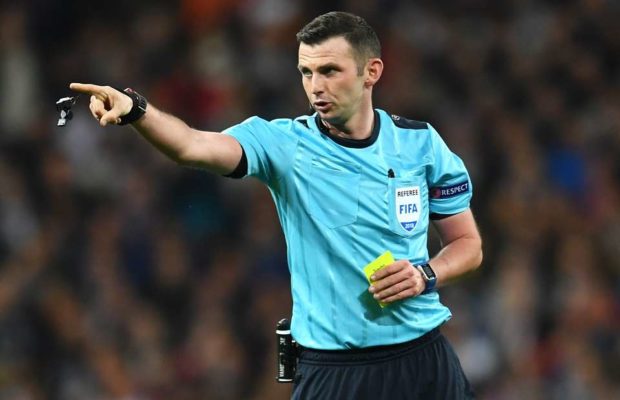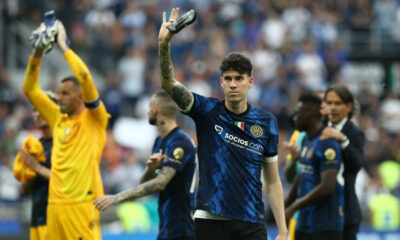Features
Former PGMOL General Manager Keith Hackett Discusses VAR And How Referees Can Make Less Mistakes
Former referee and ex-PGMOL general manager, Keith Hackett, has been discussing VAR and how referees can make less mistakes
Former referee and ex-PGMOL general manager, Keith Hackett, has been discussing VAR, how referees can make less mistakes and why he feels Michael Oliver is the best in the Premier League right now.
Hackett refereed at the highest level between 1976 and 1994 – long before referees were full-time professionals – so he understands as much as anyone what it takes to be a top-level match official.
The 74-year-old was also the General Manager of the PGMOL – the body that maintain refereeing standards in the Premier League, EFL and FA – for five years between 2004 and 2009.
Given his vast experience within the game, Hackett knows that incorrect decisions will always be part of the game as football is officiated by human beings, however, he feels referees should always strive to improve.
The key to that, according to Hackett, is fitness as referees have to be super-fit to keep up with the fast-pace of modern-day football – especially in the Premier League where the intensity is greater than ever.
The distance covered by a Premier League official has risen from 10,000m per match to around 13,000m over the past 30 years while sprints have increased by 25 per match to more than 50 as ref’s desperately try to keep up with play during the game.
Standards of refereeing in England are often criticised but a report earlier this year revealed that top flight referees get 98 per cent of decisions correct but Hackett says that when a mistake is made, it’s often because the referee didn’t see it because he’s not been fit enough to be in the correct position to see the incident.
During an extensive interview with betting firm Betway, Hackett said:
“The problem is that the game is officiated by human beings. And human beings make mistakes.”
“That management of their own fitness levels is important. They know full well that they’re going to have to take a fitness test laid out by FIFA at the start of the season.”
“You don’t want referees who guess, so the end goal is to have that dynamic when, if they’re caught out of position, they can put in a two or three-metre sprint to get into a viewing position.
“Some of our current referees lack that, I’ll be honest.”
In order to try and eliminate mistakes from the game, VAR is slowly being introduced and Hackett is fully behind the use of video technology to help match officials having pushed for it’s introduction ever since Roy Carroll dropped the ball over the line while playing for Man Utd against Tottenham in 2005.
Hackett believes that the use of VAR is a ‘natural step forward’ but he feels a greater emphasis on teamwork is essential is the technology is to be a successful part of modern-day football.
He continued:
“The referee has only got one pair of eyes, and you’ve got a minimum of 22 cameras at a Premier League game,” he says. “It’s out of balance.
“We were always better in my era because there were only three cameras, and there were only 20 minutes of the match shown. They never exposed us.”
“You had a wonderful Argentinian referee, Nestor Pitana, and an Italian VAR, who was saying there’s an error with the handball.
“If you had an English team with Webb, Clattenburg or [Mark] Halsey, ex-referees who are no longer in competition, saying to Michael Oliver: ‘That’s a penalty’, Michael’s going to take it.
“It should be a team of match officials, to develop trust between them all.”
As well as using VAR to help cut-out mistakes, Hackett feels referees must be able to communicate properly on the pitch and be able to control players during controversial moments in the game.
“If your player’s at B and you’re at A, on the triangle the other point is C – that’s where I want you to meet him,” he says.
“So I want you to not walk towards him, I want you to walk towards C, isolate him, and then have a conversation.
“And that’s got to be done not in his face, but an arm’s length minimum away from that player. Otherwise you’re seen to dominate.”
“We had a situation with Paul Gascoigne, where he was a sub, and picking up yellow cards within two or three minutes of being on the pitch.
“So as a group of referees we said: ‘Right, the referee is going to run over as though he is checking the studs, and he’s going to run alongside Gascoigne and say: ‘Hey, Gazza, great that you’re on, amazed that you were on the bench. Now, listen, don’t do anything rash.’
“That’s the key to refereeing. Exchange your knowledge of the game, exchange how managers and players behave.”
Despite no longer being part of the PGMOL, Hackett still keeps a close eye on the current crop of Premier League referees and he feel’s Michael Oliver is the best in the country right now after improving his work-rate and engagement with players.
“He’s [Oliver] the best in the country right now”.
“Eighteen months ago, I was saying his work rate’s poor, he needs to engage more with players and talk more. But he’s brought that into his game.”
Fans often disagree about decisions or particular referees, but Hackett knows his stuff and he’s clearly still passionate about improving refereeing in England.






















